Stainless Steel Hospital Equipment
Stainless steel hospital equipment involves in a wide range of medical instruments and furniture, including surgical instruments, hospital furniture, medical carts and trays, lab equipment, medical sinks and basins, operating room equipment, diagnostic equipment, etc. Stainless steel equipment in hospital can meet hygiene standards, since they can be easily cleaned and sterilized, and withstand the harsh conditions of medical environments. So stainless steel sheet is an excellent choice for all medical settings, such as hospitals and clinics.
Categories
Stainless steel also has important applications in the field of medical devices. Stainless steel materials are corrosion-resistant and high-temperature resistant, and can meet the hygiene and durability requirements of medical devices. In addition, stainless steel plays an irreplaceable role in the aerospace and energy fields, ensuring the safety of the aerospace industry and the development of the energy industry.

Shower Panels
Due to durability, sleek appearance, and resistance to corrosion, stainless steel shower panels are a popular choice for modern bathroom. Stainless steel comes in different grades, such as 304 or 316, which are well-suited for wet environments. Shower panels come in many designs, like minimalist design, contemporary and modern styles, built-in shelves and storage, multiple showerheads, touchscreen interfaces, curved or angled shapes, etc. Nowadays homeowners undertake do-it-yourself bathroom renovations since stainless steel shower panels can be designed in variety of features.
More Details
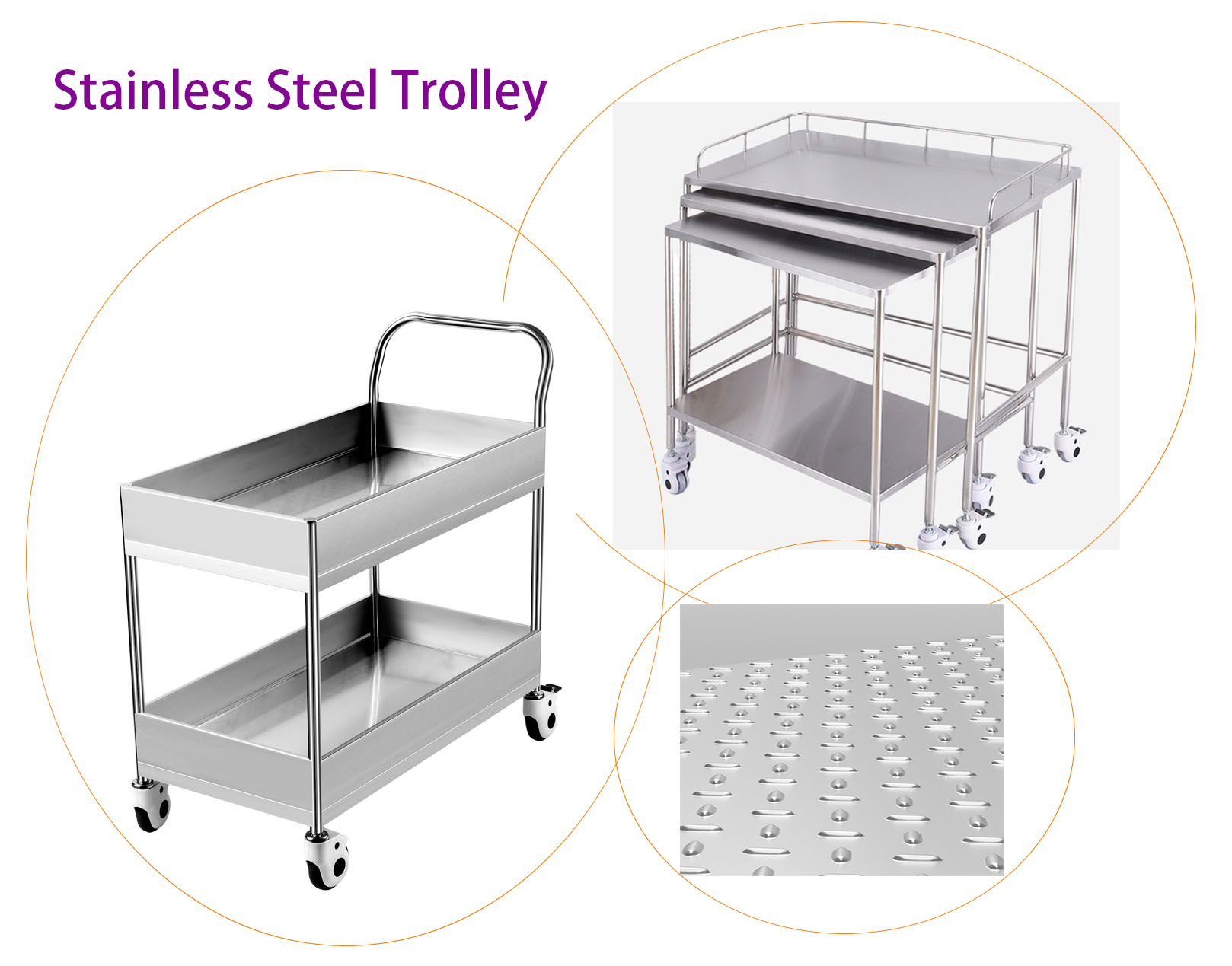
Stainless Steel Trolley
Stainless steel trolley is known as stainless steel cart, the specific features will depend on its intended use. Common characteristics include smooth and easy-to-clean surfaces, sturdy construction, swivel casters for mobility, and sometimes adjustable shelves or compartments for versatile storage. They improve efficiency and organization in various industries while maintaining the hygienic and durable properties associated with stainless steel.
More Details
Applications of Stainless Steel Hospital Equipment
Stainless steel is a popular material for hospital equipment,
which is not only functional but also contributes to maintaining a clean
and sterile environment, crucial for patient safety and infection control in
healthcare settings. Additionally, it aligns with regulatory requirements for
medical facilities.
Hospital Beds: Many hospital beds
and bed frames are made of stainless steel, which provides a sturdy framework
for patient care.
Medical Carts and Trolleys: They transport medical supplies,
instruments, or medications within a hospital, which should be durable and easy
to sanitize.
Instrument Trays: Stainless steel trays are
commonly used to organize and sterilize medical instruments. The non-reactive
nature of stainless steel makes it suitable for use in sterile environments.
Surgical Tables: Surgical tables, where patients
undergo various medical procedures, are often made of stainless steel. The
material's durability and resistance to corrosion are essential in surgical
settings.
Sinks and Basins: Stainless steel sinks and basins
are prevalent in hospitals due to their ease of cleaning and resistance to
corrosion. These are commonly found in patient rooms, laboratories, and
operating rooms.
Cabinets and Storage Units: Stainless steel cabinets and
storage units are used to store medical supplies, equipment, and instruments.
They are chosen for their durability and ability to maintain a sterile
environment.
Medical Instruments: Various medical instruments,
especially those used in surgical procedures, are often made from stainless
steel due to its non-corrosive properties and ease of sterilization.
IV Stands and Drip Poles: Stands and poles used to hold
intravenous (IV) bags and medical equipment are often made of stainless steel
for stability and hygiene.
Examination Tables: Stainless steel is commonly used
in the construction of examination tables, ensuring a clean and durable surface
to prevent the spread of infections, good for patient examinations.
Medical Trolleys and Workstations: Trolleys and workstations used by medical professionals for various tasks are often made of stainless steel, providing a sturdy and hygienic work surface.
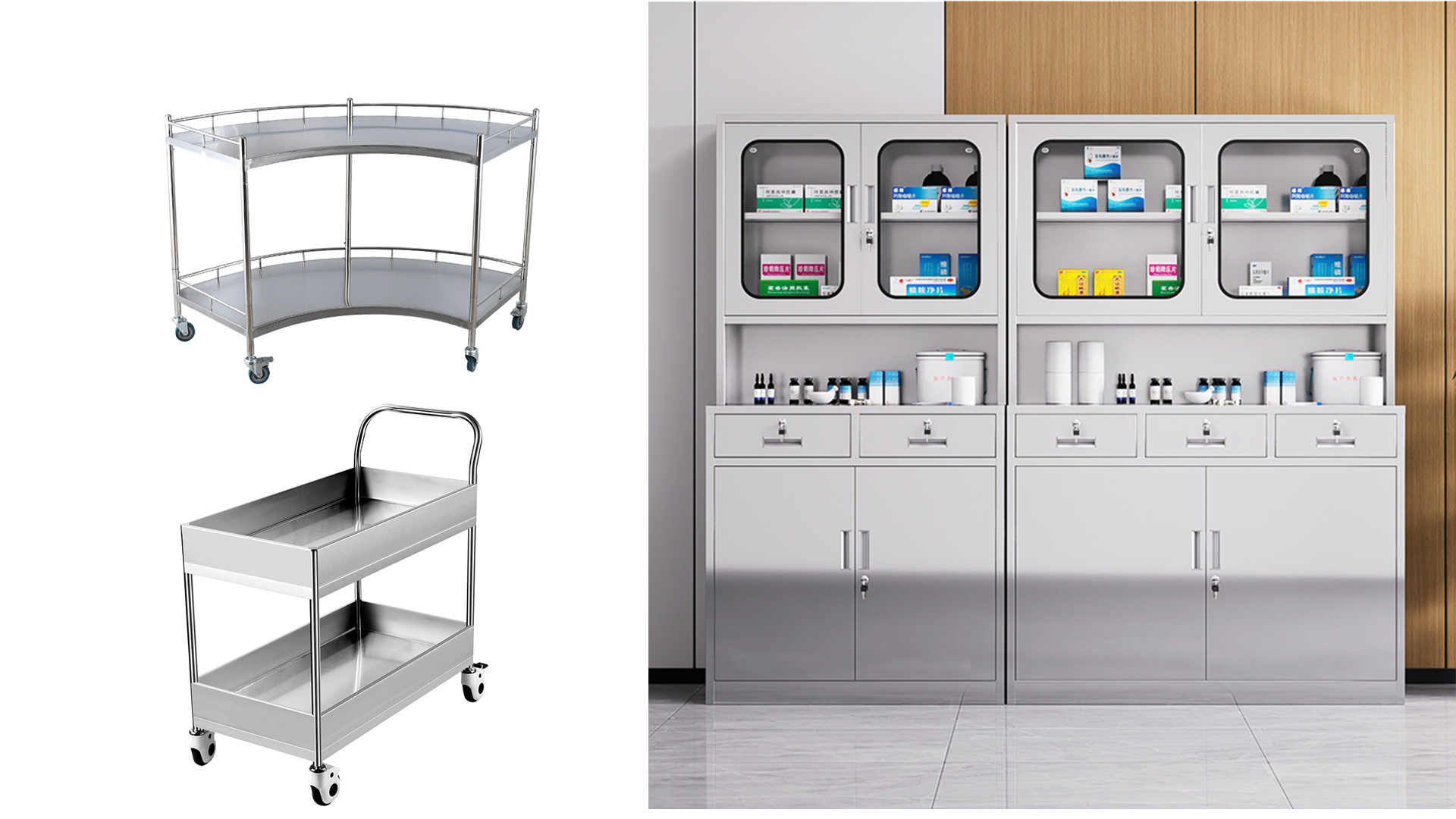
Specifications For Stainless Steel Hospital Equipment
Type: Stainless steel
sheet
Standard: GB, ASTM,
JIS, DIN
Technique: Cold
rolled
SS Grade: 304, 316
Finish: No.2B Finish,
No. 4(Satin) Finish, No.8(Mirror) Finish, etc.
Edge: Mill or Slit
Thickness: 0.8-3mm
Width: Customized
Length: Customized
Application: Healthy
Setting
Packing: PVC film
+ waterproof paper + standard wooden package
Surface Finishes for Stainless
Steel Hospital Equipment
For hospital equipment, finishes like No. 2B, No. 4, and No. 8
are commonly chosen. These finishes not only provide a clean and polished
appearance but also contribute to the corrosion resistance and ease of
cleaning, which are crucial in healthcare environments where hygiene is a top
priority.
No. 2B Finish
This is a smooth, moderately reflective finish with a bright,
unidirectional surface. It is widely used for various applications, including
hospital equipment, where a good balance between appearance and corrosion
resistance is desired.
NO.4 Finish
(Satin Finish)
This is a general-purpose polished finish with a satin-like
appearance. It is achieved by polishing with progressively finer abrasives. The
No. 4 finish is commonly used for hospital equipment, as it offers a good
combination of aesthetics, cleanability, and corrosion resistance.
No. 8 Finish
(Mirror Finish)
This is the most reflective and polished finish available. It is achieved by polishing with successively finer abrasives until the surface is highly reflective, resembling a mirror. No. 8 finish is often chosen for high-end hospital equipment where a premium appearance is required.
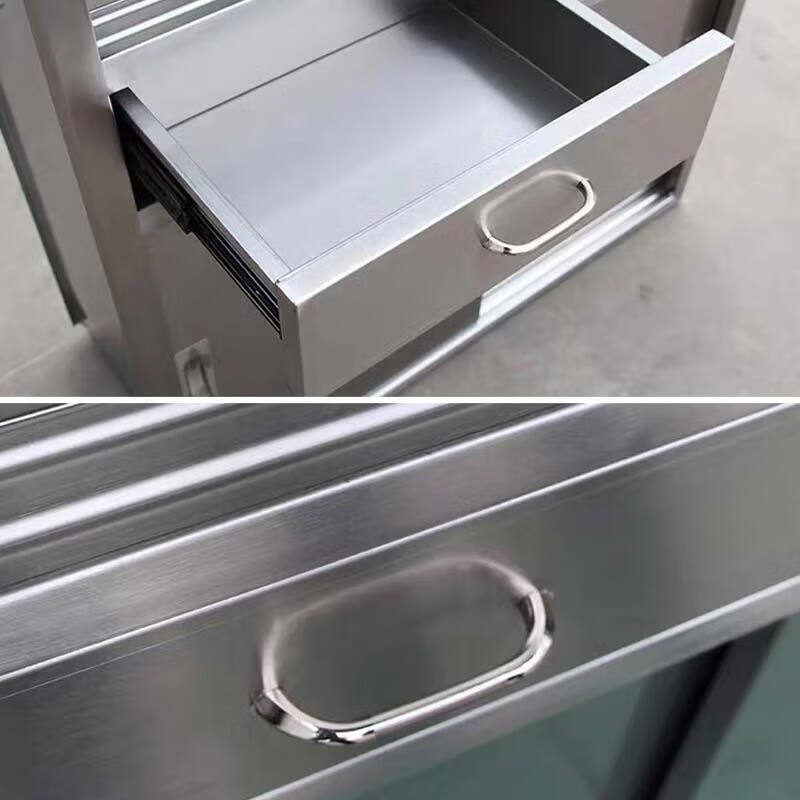
Why Stainless Steel Is Widely Used In Hospitals?
Hospitals
use stainless steel for various applications and equipment due to several key
advantages that this material offers in a healthcare setting:
Corrosion
Resistance: Stainless steel is highly resistant to corrosion and rust,
which is crucial in maintaining the longevity and functionality of medical
equipment, so it can be widely used in environments where exposure to liquids
and various substances, such as disinfectants and medications.
Hygiene
and Cleanability: The surface is smooth and non-porous, easy to clean
and disinfect, which is suitable for healthcare setting where needs to prevent
the spread of infections.
Durability
and Non-Reactivity: Stainless steel is a durable material to withstand
heavy use and harsh cleaning agents, which is important for medical equipment
and furniture with frequent handling, movement and cleaning. Stainless steel is
non-reactive, meaning it does not leach or react with other substances. This
property is crucial for medical applications where the materials used must not
introduce contaminants or react with medications or biological samples.
Strength
and Structural Integrity: Stainless steel has high strength and structural
integrity, making it suitable for the construction of various hospital
equipment, including surgical instruments, medical carts, and furniture. It can
withstand mechanical stresses and maintain its form under load.
Temperature
Resistance: Stainless steel can withstand extreme temperatures, making it
suitable for equipment that needs to undergo sterilization processes, such as
autoclaving, without deforming or losing its properties.
Recyclability: Stainless steel is
recyclable, making it an environmentally friendly choice. Hospitals are
increasingly conscious of sustainability, and the recyclability of stainless
steel aligns with green initiatives.
Surface Finishes
For hospital equipment, finishes like No. 2B, No. 4, and No. 8 are commonly chosen. These finishes not only provide a clean and polished appearance but also contribute to the corrosion resistance and ease of cleaning, which are crucial in healthcare environments where hygiene is a top priority.




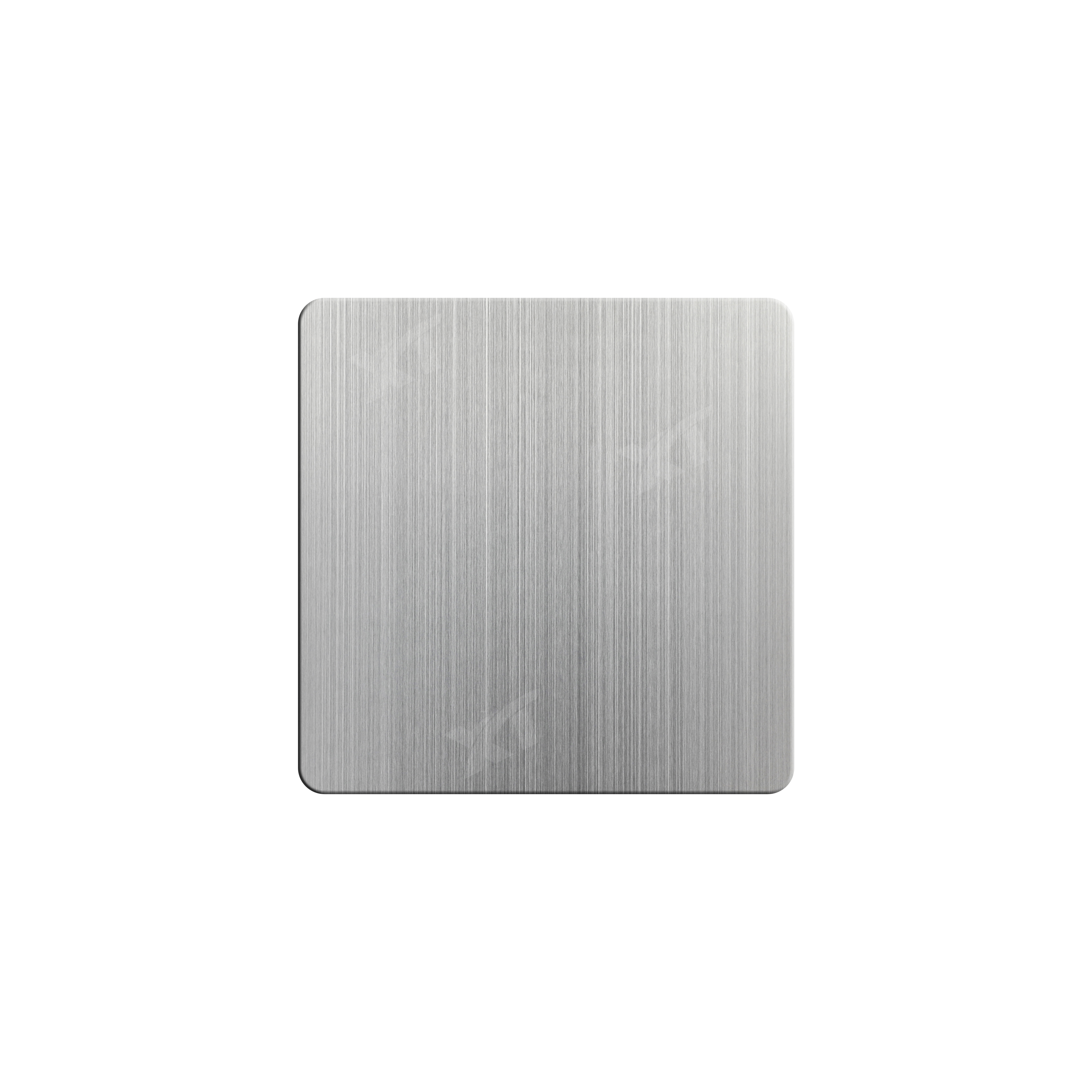
Latest Posts
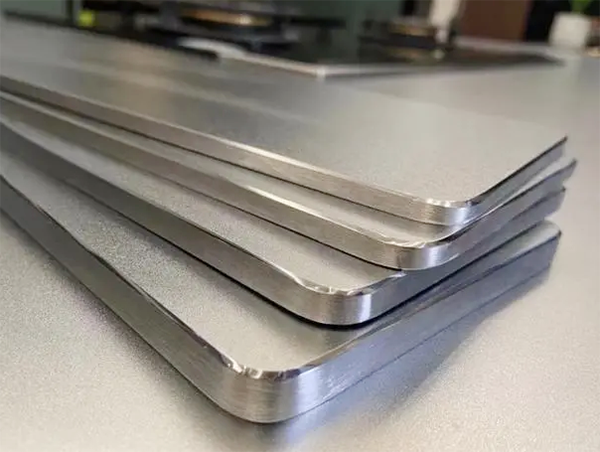
Why Are More And More People Installing Stainless Steel Countertops?
If you rarely cook and the kitchen is more of a show space for you, then you may only need to focus on whether the countertops meet your aesthetic standards and overall decoration style. If you are a cooking enthusiast

What is Perforated Sheet? How Important Does Perforated Sheet Play Role In Decor
A perforated sheet is a metal sheet that has been punctured with a series of holes in a pattern. These holes can vary in size, shape, and distribution, depending on the intended application. Perforated sheets are commonl
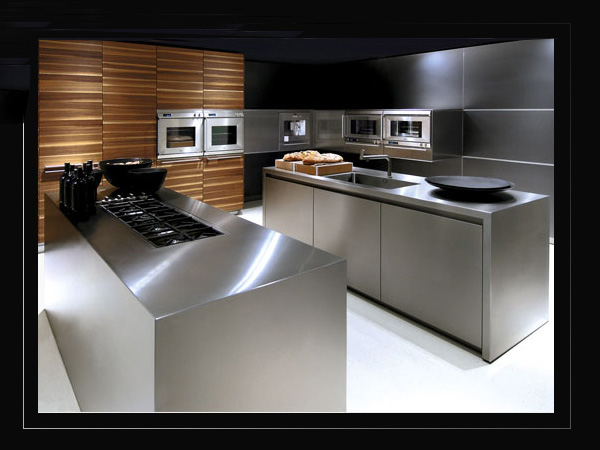
2024 Trend of Overall Stainless Steel Kitchen Cabinets
The latest report released by the National Kitchen and Bathroom Association (NKBA) provides a detailed overview of the cutting-edge trends in kitchen design in 2024. According to NKBA's research, the minimalist design co
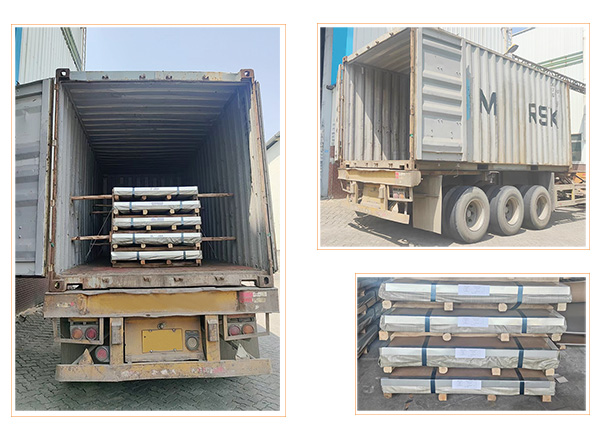
Export Stainless Steel Sheets To Bangladesh
Export 201 Hot-Rolled Stainless Steel Sheets, Cold-Rolled Stainless Steel Sheets, 8K Mirror Finish Stainless Steel Sheets to Bangladesh.



